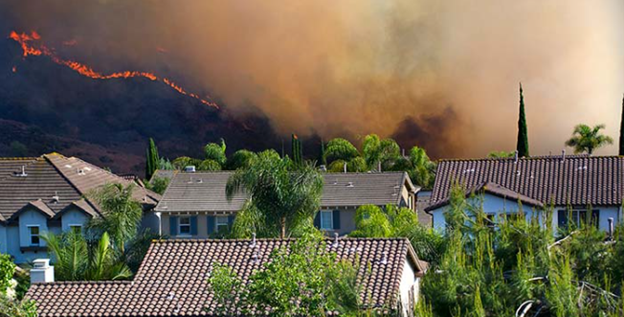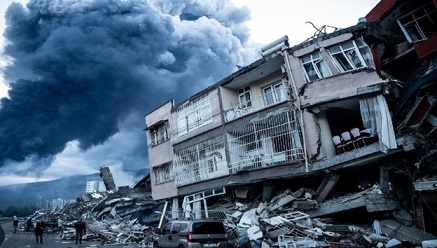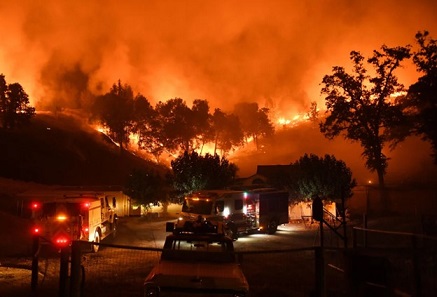| News News Main Page  Email A Friend Email A Friend
July 1, 2025
California's Division of Workers' Compensation Pharmacy and Therapeutics Committee Meeting Scheduled for July 16, 2025 July 1, 2025
Travelers Launches Landmark Preservation Initiative to Commemorate America’s 250th Anniversary July 1, 2025
California's Division of Workers' Compensation Posts Adjustments to Official Medical Fee Schedule (Hospital Outpatient Departments/Ambulatory Surgical Centers) June 30, 2025
Travelers Announces Most Frequent Wedding Claims of 2024

|  | It’s that time of year again; wildfires and earthquakes… Are you prepared?
By Nini Chow - January 9, 2025What do wildfires and earthquakes have in common? Well, if you live in California, they have a lot in common, such as:
1. They both occur in California, usually during the hottest months of the year.
2. They both can cause great and costly devastation to homes, buildings, and lives.
3. While we can’t stop either of these disasters from happening, we can take many steps to prepare for them and minimize the damage to persons and property, as well as to our pockets:
Preparing for Wildfires or Earthquakes
- Create an evacuation plan for your home and/or business. The plan should include circumstances that will activate the plan; evacuation routes to follow; a method to account for personnel, family members, visitors; and protective equipment, medical supplies, food/water, etc.
Equipment/emergency supply kit should contain:
- -Manually (hand crank) powered or solar powered radio, flashlight.
-Dependable communication devices.
- -Respiratory protection equipment, such as disposable face masks.
-Batteries (if equipment is not solar powered or can’t be manually powered).
- -Matches, lighters.
- -Heavy duty large trash bags (besides garbage disposal, these can be used as protective clothing, blankets, sanitation and toiletry needs etc.).
- -Medical supplies/first aid kits (including rubbing alcohol, hydrogen peroxide, antibiotic/antiseptic ointment, bandages, gauze, scissors, sterile pads, aspirin or other OTC type pain killers).
- -If you or family members take prescription medication regularly, keep an emergency supply of your medication and ask your doctor to provide you with an extra prescription that can be filled if there is an emergency, and you don’t have access to your medications.
- -Camper type metal small cooking pot, cup (to use to boil/sterilize water).
- -Your emergency supply kit should also contain some form of ID and cash. If a wildfire or earthquake occurs and there is a loss of power, it’s unlikely that a credit card will work to obtain money from an ATM or swiped to pay for anything from the store.
- -Non-perishable food items or food items that have a long shelf life (such as canned goods, MREs). NOTE: Be sure to have a can opener if you have canned goods.
- -Water supply.
Alarms and Detectors: Ensure that the smoke alarms and carbon monoxide detectors are checked regularly and if they are equipped with batteries that the batteries are changed out at least every 5 years. Also, most smoke detectors are built to only last up to 10 years and then they need to be replaced. Be sure to keep records of when the smoke detectors were manufactured and installed and replace them when necessary.
Fire Extinguishers: These need to be checked regularly to make sure they are fully charged and operational. If they need to be recharged, there are vendors that can recharge them for you (Quick tip, it’s cheaper nowadays to just replace the portable fire extinguishers rather than having them recharged).
Maintain landscaping: Be sure to keep your landscaping in good condition. Remove dry or dead brush. Keep trees and plants healthy and green and they are less likely to burn as quickly as dry or dead foliage.

If you store valuable items and important documents at home, consider purchasing fireproof safes/fireproof storage boxes. The UL classification of safes will note the highest temperature the safe can withstand and for how long.
In the case of an earthquake, consider purchasing an emergency generator in case power is down and won’t be restored for some time.
Purchase and install earthquake safety devices, such as specialized straps for your heavy furniture items (such as tall/heavy, free standing cabinets, water heater).
Review appliances and make sure any old or worn connector hoses, pipes, wires, are replaced with new and flexible ones.
During a Wildfire or after an Earthquake
- If your location is deemed to be unsafe and/or you are told by authorities that you need to evacuate, be sure to do so. Do not argue with or disregard an order given by civil authority. Never return to an evacuated area until officials have given permission to do so.
- During wildfire or after an earthquake there may be issues with the air quality, such as smoke/soot in the air or gases escaping from a severe earthquake. Be sure to have good air filters such as masks to help reduce inhalation of smoke, dangerous/noxious fumes, or poisonous vapors.
- As noted previously, have operational firefighting or fire containment equipment on hand such as fire extinguishers, water supply, water hoses, fire blankets, and/or long handled metal rakes and shovels to help dig up ground, pull up undergrowth, and swat out fires.

After a Wildfire or Earthquake
1. Make sure all parties are accounted for and are in a safe place.
2. Assess the damage and injuries.
3. Make sure you have plenty of water or other types of hydration (such as sports drinks and thirst quenchers).
4. Provide first aid as needed. Treat non-critical injuries like minor burns, scrapes, cuts with bandage, and topical ointments. Clean and disinfect wounds as best as possible.
5)Wear protective gear if you are moving through wildfire or earthquake impacted areas, cush as gloves, jackets, long pants, covered, flat comfortable shoes.
6)Communication through cell phones may not be available. Consider landlines, hand held two-way radios.

Last, but not least - Insurance Preparedness for Wildfires or Earthquakes
-Review your Property Insurance policy for your residence or your commercial business.
-Check the policy limits to make sure it is sufficient to cover the property for damage or possible total loss.
-Check to see if “other structures” have a separate limit of coverage and what “other structures” are defined as (for instance, some policies do not cover your property fence if it is not attached to the property).
-Know what your deductible is as this will be your share of the cost to repair or replace damaged property. Insurance will only cover the damages that are above the deductible.
-Know if your policy provides specific sub limits for personal property items such as money, jewelry, electronic equipment, computer equipment, collectibles.
-If you have high-valued items such as jewelry or collectibles, consider scheduling those items for specific appraised values.
A word about the California Fair Plan property insurance policy.
-Typically, it only covers fire and lightning as a covered cause of loss.
-Theft coverage may be offered but would be an additional purchase. (Theft coverage is important to have especially if property owners much evacuate for a period of time and burglaries and looting may occur)
-A DIC policy may help cover for other causes of loss/perils that the CA Fair Plan does not cover.
-Speak to your insurance agent to learn more about additional limits of coverage for your property or additional policies of insurance to supplement your property insurance coverage, such as an earthquake policy.

Nini Chow was born in Myan Mar (formerly Burma), raised in New York, and attended U.C. Irvine. She has a BS degree in economics with a minor in management. She is VP of Property & Casualty Claims at The J. Morey Company. She is successfully representing a variety of clients from small to national accounts, in a variety of insurance matters. Nini is a National Kidney Foundation advocate who lobbied both the California State Legislature and Congress for equitable kidney care for all.

Lonce Lamonte, publisher, editor, adjustercom; copyright by Lonce Lamonte and adjustercom; all rights reserved. lonce@adjustercom.com
|


